There are three missing men on this safari vehicle.
One of them, the one I’ve already talked about a lot, is my Dad.
Another man was Dennis, whom I knew. He was a furniture salesman at Bob’s Discount Furniture Store and he was more than that and also exactly that. He wouldn’t have wanted someone to think that he was ashamed at being a salesman at Bob’s Discount Furniture Store. He was, I am absolutely positive, a stellar salesman: brimming with energy, a joke for everyone, and a big heart in the way that meeting a zillion people from all walks of life with all kinds of stories will give you a big heart, if you let it.
He was also more than a salesman in the way that we’re all more than our jobs: he was a Buddhist. A devoted father and step-father and husband. And he died without warning: Devorah, my husband’s cousin, walked out the door to their home one day a wife and walked back in, just a few hours later, a widow.
It was the second time such a thing had happened to her. The first time, when she lost the third, final man missing on this safari vehicle, their daughters, Jenna & Mari, had been young.
Akira was his name & I never knew him. He was a Japanese-American artist, and he died due to an accident in his wood shop. All three women he left behind — Devorah his widow, Jenna & Mari their daughters — have thick black hair that can be raised or lowered like funeral veils across their faces.
I got the news about Dennis’ death on the way back from the safari with my Mom on the one-year anniversary of my Dad’s death. It seemed natural to invite Devorah & her daughters to the next (and, so far, final for me) safari to Kenya.
How did animals and death get so bound up for me? This is how, and also, this is not at all how. This is just the expression of what was already there. There was already carnage & redemption & grisly details & dawn out there in the bush, every day, whether I’m there or not. It’s going on as I write this.
Mari couldn’t come but Devorah & Jenna could.
The first night we landed in Kenya, we got our bags and cleared customs and walked confidently into the humid night air of the terminal and there was no one to greet us. We did a little milling around. Other people were getting picked up by their tour companies. It was going to be fine.
But then those people were gone.
I had arranged this whole damn thing. I had my mother with me, people from my family, my husband’s family. There was a long pause. I could feel the freak out building behind me. I found a payphone, somehow made a call, the person on the other end said, unhelpfully, that there should be someone there.
Just as the real freak out started, the guide showed up, led us to two cars that had been hired for us, it was fine, we were Ok. “What’s your name?” We asked of the drivers.
“Dennis,” said the first one.
We were more than fine. The heavens had chosen to look on us with favor. “Yes, but why that name?” I heard the whisper from the backseat.
I relaxed. I knew I didn’t have to do any more work for the rest of the trip. We didn’t have to see a single animal. It was worth flying halfway across the world to hear a single name.
Several transfers and one safari camp later, it was dawn, and Devorah, Jenna, Michael, and I were watching elephants.
When I got back to DC, I went to go see a photographer I had taken a few lessons from, a guy I thought maybe might become a mentor to me. He lived in a condo in the burbs, a two-bedroom place about 45 minutes from where I live, with one bedroom filled with enormous monitors and hard drives and photography equipment. We took a seat in there & opened up my laptop; he scrolled through the thousands of photos I had taken on the Kenya safari in a matter of seconds.
“So, just an ordinary safari?” he asked. “Nothing special happened?”
He was right, I realized it then. There was nothing extraordinary about my photos, no particular magical moment captured. The elephants weren’t chased by lions. I didn’t witness a baby struggling to survive while crossing a river.
I didn’t see enough action while on safari. I’m sure he knew what he was talking about.
I did get to spend some time with wild elephants, though, and Devorah, and Jenna, and Michael. Let me try to tell you what that was like.
I’ve described before being woken up before dawn and what happens with the hard tack and coffee and because I love the ritual so much I’ll probably tell the whole thing again some time but not right now; right now we’ve scrambled onto the vehicle with its three-tiered seating and we’re driving out into the bush.
The sun rose behind a couple of giraffe, ambling through the golden grass.
We had already spent time — a great deal of time — with elephants. We were about to spend more. Everyone agreed that we could sit with elephants forever and never get bored.
Elephants have complex modes of communication and a matriarchal society. (Interestingly, the scientists who study them are also often women. For more on elephants and communication, I enjoyed The Elephant’s Secret Sense by Caitlin O’Connell and used it to help write the essay, “The Elephant’s Tiptoe.” Basically, elephants often use vibration to communicate across vast distances, and they pick up the vibrations using fat pads in their feet.)
When young male elephants reach their teenage years, they move off from the herd to form bachelor groups or to wander as solitaries. Often, they do both: sometimes joining all-male groups, sometimes looking for a mate alone.
It’s fun being around a big male or two, though you should keep an extra-long distance if they’re in musth (in heat). But it’s even more fun being around the herds of female elephants, looking after the kiddies, finding the day’s water and food, and following the queen whose word is absolute.
I noticed Jenna watching the mothers and aunties watching over the babies particularly. “They’re so pure,” she whispered. “They have the purest energy.”
That morning, the herd we were with was taking a mud bath.
Kenya’s elephant population has, thanks to the tremendous efforts of thousands of people, started to make a comeback. According to the BBC, “Back in 1989 there were just 16,000 elephants in the country, by 2018 that number had increased to 34,000.” (The numbers for East Africa and Africa as a whole are more mixed.)
We stayed with the group for a long time — long enough for this elephant calf to get perhaps a little better at using her trunk?
Anyway, nothing much happened on the safari except that, just a few weeks ago, Jenna had a baby girl, named Akira, after her Dad.
Nothing much happened except having cracked ourselves open to the elephants, they stayed open. Now, when the elephants rumble their massive rumble, we feel it in our feet.
Thanks to Michael, who let me know that killer whales are 'attacking' sailboats near Europe's coast and scientists don't know why. My favorite part of all of this is the theory that it’s an orca fad — much like wearing fish on their heads was a fad in the ‘80’s (remember that one? That was so 80’s!) — and they’ll grow out of it soon enough.


As always, please let all of us know in the comments below if you’ve had your life changed by an animal, if your boat has been attacked by an orca, or if you’ve started wearing a fish on your head.
Also as always, I’m wishing you a wanderful week.

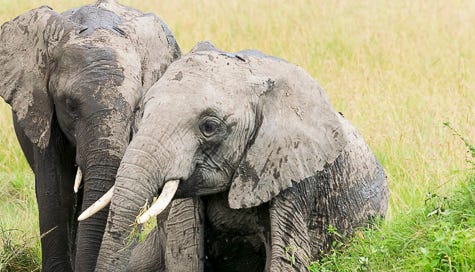



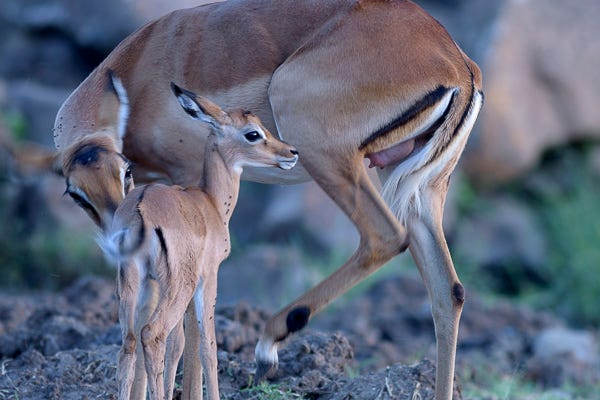
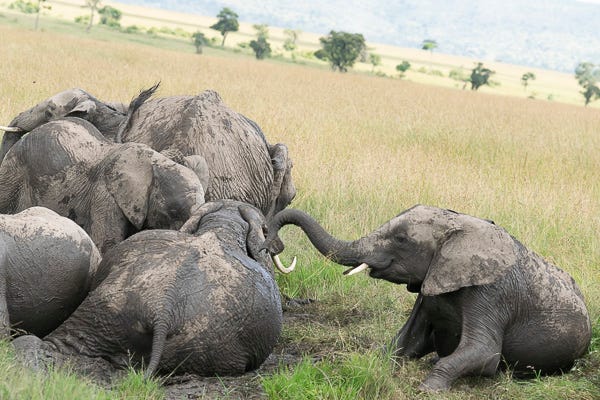
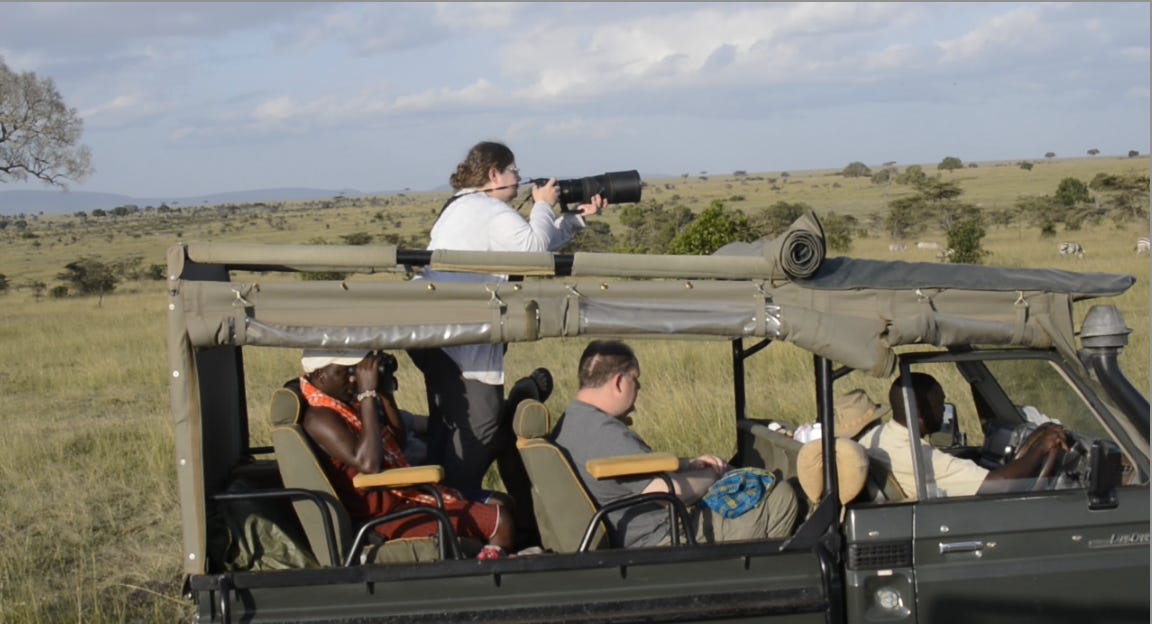

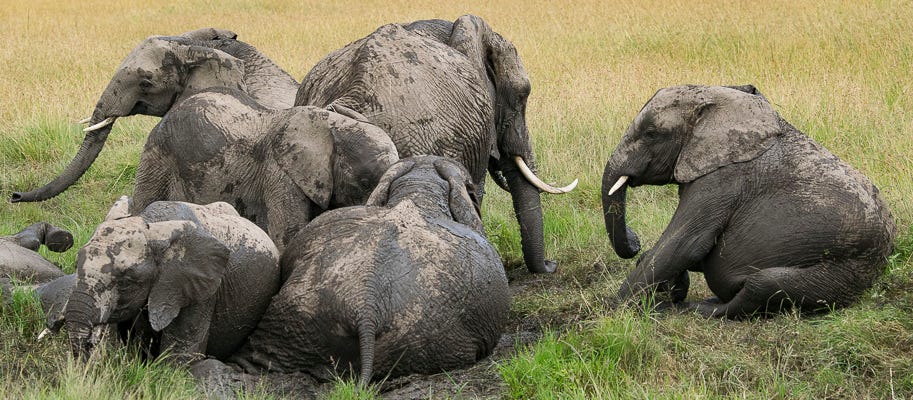

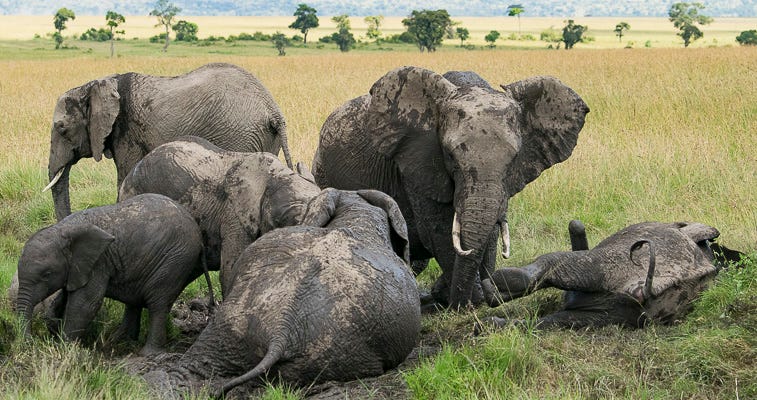
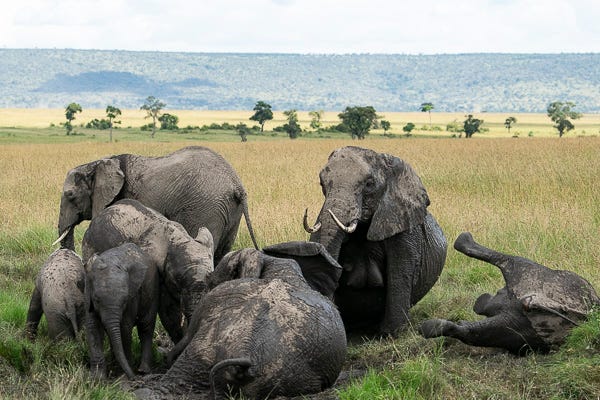
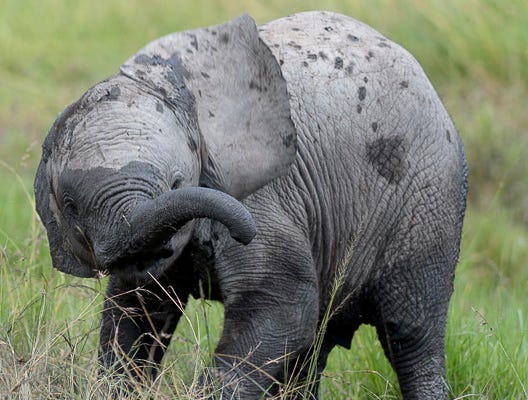
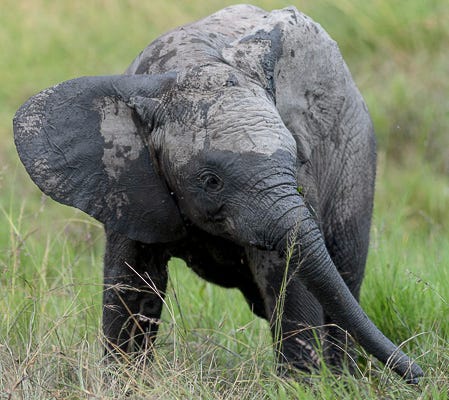
I really enjoyed your photos - regardless of what the photog mentor sez.
IMHO there's no such thing as a bad animal photo, especially for the person lucky enough to click the shutter.
You say animals and death are strangely connected for you, but you bring life out of death in the terrific photos and stories of elephants' mud baths and now Jenna's baby Akira!